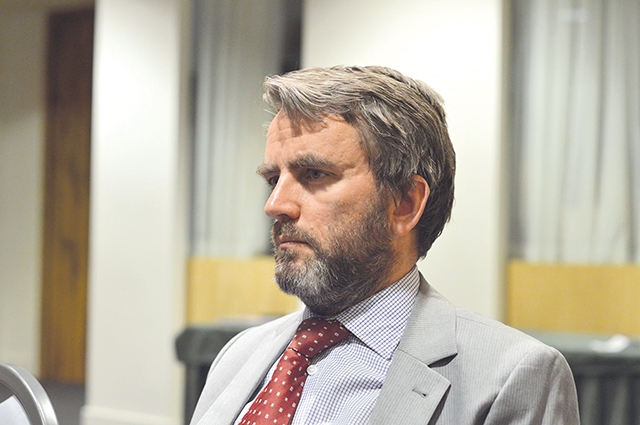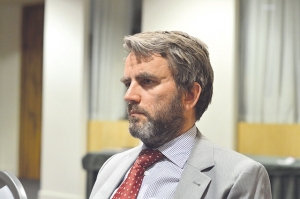Hans Gutbrod on Karabakh: Peace Perspectives & the Impact on Georgia
Interview
As the rest of the expert and opinion making world is busy trying to determine who the winners are and what the next clever scheme of Putin’s might be, Ilia State University's Professor Hans Gutbrod discusses peace perspectives after the Karabakh truce.
“For now, this is a ceasefire: we will still need to see how actual peace arrangements develop, and everything will hinge on this,” he says. “The question of Karabakh had been hanging over the Caucasus like a Sword of Damocles. Now that sword is down, with painful losses, and for the time being, it is still a moment of grief.
“But beyond that grief, if we manage not to put another Sword of Damocles up, that would be an achievement. At least the question of returning hundreds of thousands of displaced Azerbaijanis may be resolved, and this could be a new beginning. If the settlement gives a dignified solution to Armenia, this would greatly help long-term stability.”
How does this new deal change the power balance in the region?
Perceptive Russian analysts have pointed out that Russian engagement in Syria could be seen as a trial-run for Central Asia: how do you keep stability in a country where the president is the not-particularly-competent son of an authoritarian leader, while keeping Russian military engagement as small as possible? It's not necessarily that the Russians believe these authoritarian leaders are great, but more that they don't see a viable alternative to stability. While people in Georgia know the downsides of Russia, it’s worth remembering that the West hasn't delivered great solutions in these difficult contexts either, not in Syria or Libya, nor in Afghanistan. Russia may soon face this substantial challenge in Central Asia, with multiple transitions, right on their doorstep, and with quite a few ethnic Russians as well.
If we follow that interpretation, the Kremlin learned in Syria that they could live, broadly, in sorting these arrangements with Turkey, even if Turkey was on the other side: both sides kept out the West, looked after their own interests, soaked up local constituencies as allies, and kept out the radical Islamists, which are a worry both for Russia and for Turkey. In that way, Russia may have felt that even when they are on the other side, Turkey plays by the same rules of the game, and that they are broadly comfortable with having them in the region, also to keep out China, which will be a concern in Central Asia. Karabakh may just be part of this much broader understanding.
Again, this puts it into an incredibly broad sweep, but there may be something to this perspective.
On the impact of Russian peacekeepers in particular: how is it going to affect things?
Russian peacekeepers are apparently seen as a very big factor for Azerbaijan. In the end, I'm not sure how substantive they will be, as it’s a small contingent. It's more of a tripwire, and a way for Azerbaijan to have a presence that explains, internally, why they don't take over Stepanakert. This certainly was a popular demand, but would have created all sorts of problems, ranging from potential ethnic cleansing, to potentially having an unhappy Armenian minority. Notably, the former US diplomat Matt Bryza, well known in Georgia and now working with oil-connected companies in Azerbaijan, warned that Azerbaijan would have “international pariah status” if it engaged in mass ethnic cleansing.
Who are the winners and losers?
First, the losers are all the families that have lost a son, a father, a brother or an uncle. This is what war does: it brings irrevocable loss. When speaking about the future, one may want to recall that many families may not even have buried their dead yet. This is a time of grief.
Second, it is still a bit unclear who the winners will be. You can win a conflict, but still lose the peace: arguably this is what happened to Armenia, which won in 1994, but didn't manage to turn this into a lasting peace, and we have been living in that warped world of closed borders and armed front lines for almost three decades. I think the challenge now is to find something that will actually open up the region, and to build something that gives us the prospect of leaving all this terrible past behind.
The fact that Azerbaijan’s strategic patience and militarization approach actually enabled them to achieve their goals might be seen as a demonstration that it’s the way to go for other countries.
Various countries will look at this with great attention, to figure out what the lessons for them are. Practically everywhere, you see discussion on the use of drones. It's an unpleasant subject, but the war was a little bit like cavalry against machine guns. That said, one can expect that militaries will adapt quite quickly, and more developed countries will find this easier.
One should be careful not to exaggerate: in this case, Azerbaijan had Israeli weapons, Turkish weapons and officers, outsized wealth compared to Armenia, and Armenia's strategic partner decided not to take an interest. This is a rare alignment, and I'm not sure that, say, Ukraine, can learn much when it comes to its own separatist territories.
What does the future hold for Karabakh itself and its status?
Again, I think this will become apparent in the upcoming negotiations. If Azerbaijan and Turkey play this well, it’s possible there will be arrangements that Armenians can live with; that give them dignity in the moment of defeat; in which borders open, trade begins, people can (cautiously) cross back and forth. The key is to avoid the mistakes of the past, and to try to push for a solution that the various sides can live with, with dignity.
This is a radical thing to say, but I think it might make sense to think about a much more comprehensive settlement of conflicts beyond Karabakh, too, so that societies can focus on making life better for their citizens, and addressing the many pressing challenges.
Could it be a lesson for the West on how games are played in this region?
The West is very good at a particular kind of politics, at developing institutions, at being respectful to its own citizens, at building social infrastructure, and creating a desirable place to live. The very people that often speak dismissively of the West buy expensive apartments in Chelsea or Manhattan, and send their children to boarding school in Switzerland.
At the same time, the West just isn't good at cutting through the proverbial Gordic knot. That's not how Western bureaucracies function.
The West will maintain a strong role, but for different kinds of games. These games, if that’s the right term, are actually really important to make lives better for citizens by developing economic institutions, capital markets regional integration, and delivering good education. In that way, I think the West will likely continue to matter in the region.
What will the impact be for Tbilisi?
Right now, I think it’s just a huge relief that the fighting is coming to an end. To thrive, Georgia needs to live in a peaceful Caucasus.
Perhaps this is a moment to recognize both the Azerbaijanis and Armenians in Georgia, as well as the Georgian authorities, for their managing to keep the peace, in what was a terribly difficult time. There were small gestures, such as the Saturday night vigil for peace by Malkhaz Songulashvili, the Metropolitan Bishop, assisted by both Azerbaijani and Armenian religious figures. This was admirable, in such a difficult time. It has been said many times, but I do think that Georgia can be a model for coexistence between Armenians and Azerbaijanis.
Does the potential Nakhichevan corridor and border with Turkey threaten Georgia’s transit country status?
The potential corridor does reduce Georgia's transit country status, but this may not be a bad thing for the country. As the writer and critic Akaki Bakradze said a long time ago, carrying a freshly cooked chicken past me gives me the smell, but not the food. I'm not convinced that hundreds of trucks crossing Georgia every day leave that much in terms of revenue and development. I think it makes more sense to focus on other areas of development, including high-revenue tourism, export agriculture and manufacturing. These are the fields of real opportunity, and will require much more patient work to turn into a success.
By Vazha Tavberidze












